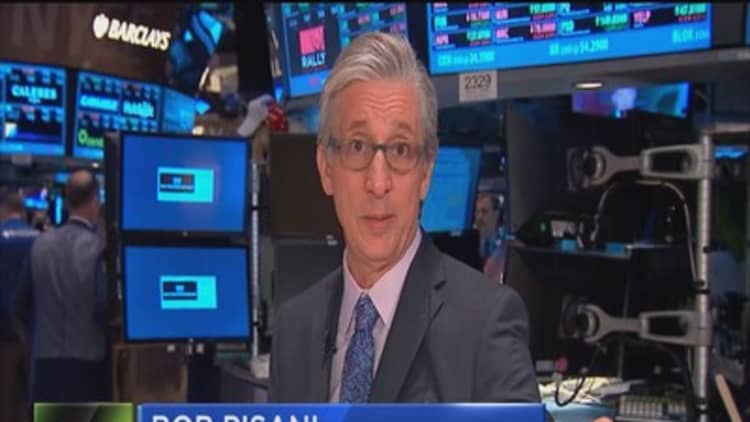
China has been slowly opening the door to foreign investors, and it may soon get even more global exposure at a time when its stock markets are sizzling hot.
Index giant MSCI announces Tuesday its much-anticipated decision on in its $4 trillion emerging market index. Inclusion in the index would unleash a flood of buying of the mainland-listed shares by funds that track the MSCI as a benchmark for emerging markets. (Tweet This)
"Given the IMF is also expected to decide on the Chinese yuan's status as a currency to be included in Special Drawing Rights (SDR), A-shares' inclusion in the MSCI EM could mark 2015 as a 'coming of age' for the Chinese financial system," said Tai Hui, chief market strategist for Asia at JPMorgan Funds.
Foreign investors already can invest in China. The Shanghai-Hong Kong Stock Connect was , and it allows such investors to trade Shanghai A-shares through the Hong Kong Stock Exchange. Mainland investors also gained access to Hong Kong shares, known as H-shares.
"China's opening up could be the surprise story of 2015," said Michelle Gibley, director of international research at Charles Schwab.
China has previously been turned down by MSCI for inclusion in its 27-year-old emerging market index. Last June, MSCI decided against including China's A-shares in its EM index based on the constraints of China's existing qualified foreign institutional investor programs. The QFII and a separate yuan-based program were the only vehicles at the time that investors could use to directly access China's markets.
Read More
MSCI, while voting against China for its emerging market index, did launch last year a separate A-share-specific index, which is tracked by the KraneShares Bosera MSCI China A ETF (KBA).
"It's obvious the Chinese authorities have been taking a number of steps to gradually allow access to foreign investors around the world," said Dimitris Melas, global head of new product research at MSCI. "One of the important developments in the last 12 months is the development of the connect program."
China has taken the right steps to open up its markets since then, and that could make MSCI more open to including A-shares in its index, analysts say.
Read More
"I don't think there are any big, sweeping changes they have to make. It's just the details," said Barnaby Nelson, managing director of investors and intermediaries in northeast Asia and Greater China at Standard Chartered. "There's a very strong sense we're in the last phase before opening up."
Nelson and other analysts cited many developments in China during the past year, including quota increases for foreign investors, and the expected expansion of stock connect to include the A-shares, or stocks listed on the Shenzhen exchange. China is also moving to allow reciprocal trading in mutual funds between Hong Kong and Beijing.
Melas said MSCI determines index eligibility from a country's economic development, the size and liquidity of the market, and market accessibility. Many investor products use MSCI's emerging market index as a benchmark or track it, like iShares' EEM ETF.
Some funds have already taken the first steps to bring A-shares to global investors. S&P Dow Jones Indices launched an index in May for 75 A-shares available through the Shanghai-Hong Kong Stock Connect. On Tuesday, Vanguard announced it would add A-shares to its $69 billion Emerging Markets Stock Index Fund and ETF (VWO).
"It was really a decision based on the investibility of China and the investment trend," said Joe Brennan, head of Vanguard's Equity Investments Group. In the last month or so Vanguard received approval to invest up to 10 billion yuan ($1.6 billion) in Chinese securities and is seeking to double it.
The revamped Vanguard emerging markets fund's benchmark is the FTSE's Emerging Markets All Cap China A Inclusion Index, launched last Tuesday. Initial weighting of A-shares will be 5 percent, with an expected increase to 32 percent with greater access to capital markets.
Similarly, analysts say next week's announcement on MSCI's emerging market index is more symbolic than immediately market moving.
If MSCI decides in favor of A-shares, the stocks won't be fully implemented into the index until a year later. Including H-shares and other China-related stocks, the addition of A-shares is expected to boost the index's total China exposure to 37.5 percent from about 25 percent, Melas said.
Initial market and investor reaction to the Stock Connect was muted given the low amount of foreign trading allowed. Even today, the total market cap of foreign investment through the connect and the Qualified Foreign Institutional Investor program is less than $1 trillion, or below 10 percent of the Chinese market capitalization, according to ChinaQFII.com.
One sticking point might be the absence of Shenzhen's A-share market in the connect, said Charlie Galligan, managing director and head of program trading at Convergex. Shenzhen, up 114 percent year to date, has outpaced the Shanghai index, up nearly 53 percent so far this year. However, China remains on the right path, and expectations are for Shenzhen to be added later this year.
"As China's capital markets become more mature and China's GDP gains weight, MSCI will eventually add China A-shares to accurately reflect global equity market opportunities," Galligan said.
Many Western investors are already in China's stock rally.
Sameer Samana, global strategist at Wells Fargo Investment Institute, said the DBX X-tracker ETF for Chinese A-shares (ASHR) quadrupled the number of shares outstanding in the last year to 28 million.
"Last year no one even knew about it," he said. ASHR launched in November 2013 and has a market cap of $1.5 billion.
To be sure, A-shares are not the steadiest of investments if Thursday's 5 percent swing in the Shanghai composite is any guide.
Read More
"A-shares appear somewhat expensive and could be vulnerable to a pullback given the rapid rise over the past six months," Gibley said. However, she does not think any short-term decline is the beginning of a bear market in China.


